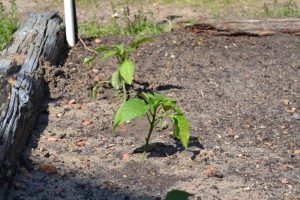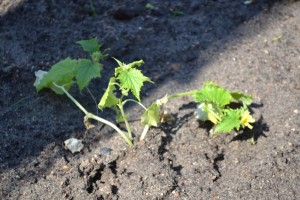by Eddie Powell | May 20, 2013
Protecting new vegetable transplants in the garden can be very challenging for most gardeners.
Continue below for a few tips that will make transplanting vegetables more successful:
- Create A Collar: A collar can be made from a bottomless plastic cup or a waxed cardboard carton to protect transplant from cutworms. The collar should extend one inch above and below the surface of the ground.
- Row covers can be placed at planting to keep insects out. Remember to leave plenty of excess material for the growing vegetable plants. Remove the row cover when plants that need bees for pollination begin to flower.
- Make sure to plants stay in a continuously growing state and in a state of good health by supplying appropriate amounts of water and fertilizer. A healthy plant is more than likely going to survive an insect attack than a sick plant. However, too much fertilizer can cause plants to be more inviting to aphids and whiteflies.
- Monitor or scout the garden twice weekly for pest problems. This means inspecting the vegetable plants from both the upper and lower foliage to the soil level. It is best to keep a record book on pest problems and the performance of different varieties. Also include photographs of insects, diseases and beneficial insects. Be sure to correctly identify the insects.
- The ability to identify beneficial insects of the garden is important (praying mantis, spiders, big-eyed bugs/assassin bugs, lady beetles, and all wasps). Plant flowers in the vegetable garden that provides nectar and pollen which will attract beneficial insects.
- Most large insects like caterpillars can be removed by hand and destroyed.
- Watch for disease symptoms early and remove any diseased leaves or plants to the prevent problem from spreading. Most plants that produce fruits, pods, or ears can stand up to 20 percent loss of leaves without loss of potential yields. Do not panic and start spraying at the first sign of leaf feeding or a sick looking plant. Call or visit your local University of Florida Extension Service for recommendations on controlling any vegetable insect or disease problem.

Image Credit Eddie Powell

Image Credit Eddie Powell
By Eddie Powell
by | May 10, 2012

Eddie Powell
Extension Horticultural Courtesy Agent I
Walton County
pep5@ufl.edu
With spring in full swing many Florida homeowners are gearing up to grow their own vegetables. The most frequently asked question this time of year is, “why do I need to fertilize my soil?” The answer is simple – – not all nutrients are present in the right amounts to support good plant health. North Florida is a prime example of an area lacking certain nutrients, since the soils in this area are generally infertile and acidic. Therefore, ample amounts of lime and fertilizer must be applied to the soil for adequate plant growth. If this is not done then the crops will suffer from inadequate plant growth and food supply.
Most vegetable crops grow and perform best at a pH range, 6.0-7.0. A soil sample must be taken to determine soil pH. Feel free to bring one of those samples by your local University of Florida Extension office for your soils pH results. Now if the pH extends far below or above this range, then crop productivity will be significantly reduced. This happens because the crop cannot utilize the fertilizer properly. In other words, this causes the plant to use too much of some nutrients (like manganese, zinc, and iron) that are required in very small amounts and too little of some nutrients (like nitrogen, phosphorus, and potassium) that are required in larger amounts. The plant system becomes upset so to speak and does not function well and some plants may even die.
To avoid having your crop suffer because of a lack of fertilizer, contact your local University of Florida Extension Agent and ask he/she to help you select the best kind of fertilizer for your crop. After you have selected the correct fertilizer, make sure to ask your agent to assist you with following: to figure the correct amount to be applied to the area where you plan to grow your vegetable crops and also how to apply the fertilizer to the soil so that your plants will use it properly for an excellent crop yield.
Things to remember:
To keep your soil pH range between 6.0 -7.0 so that your crop can uptake the fertilizer properly and make sure to apply the correct amounts of fertilizer to the soil so that your plants will not suffer but produce high quality produce.



